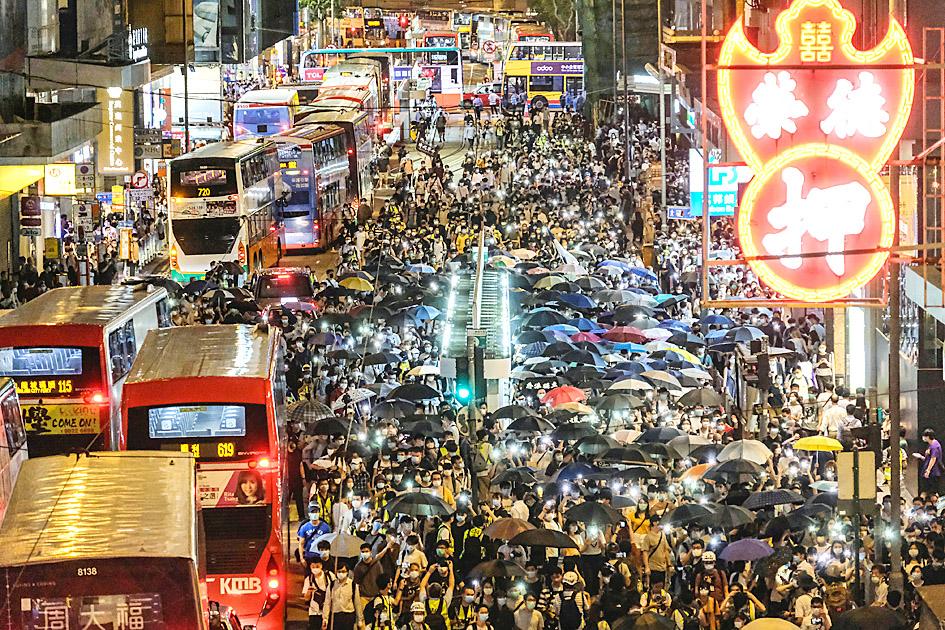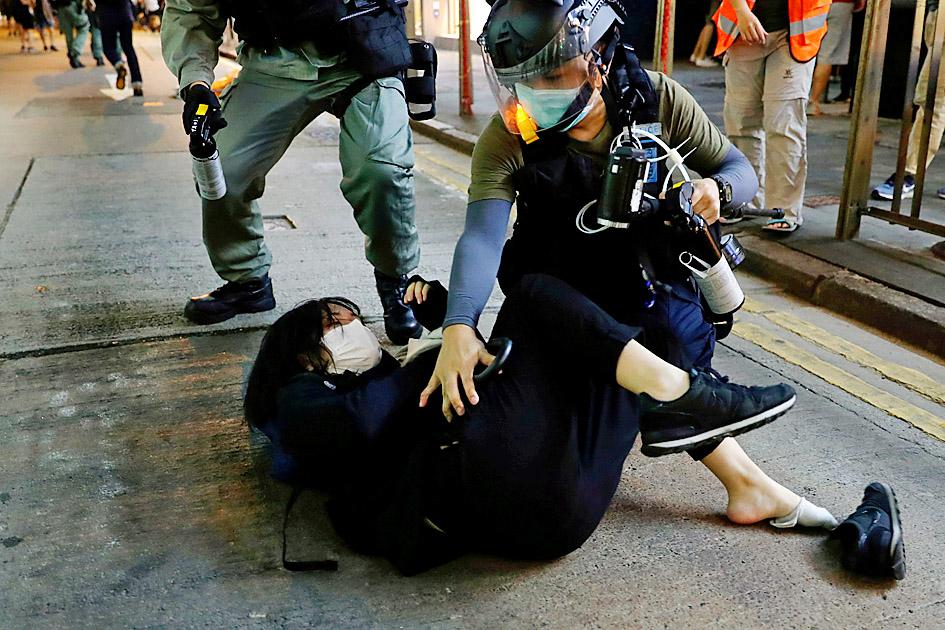Several thousand demonstrators marched in Hong Kong yesterday evening — defying authorities a year after huge pro-democracy protests erupted — as the movement struggles in the face of arrests, COVID-19 bans on crowds and looming national security legislation.
Seven months of massive and often violent rallies began on June 9 last year, when as many as 1 million people took to the streets to oppose a bill allowing extraditions to mainland China.
As Hong Kong leaders dug in, battles between police and protesters became routine, leaving the territory’s reputation for stability in tatters and swathes of the population in open revolt against Beijing’s rule.

Photo: Bloomberg
A year later, protesters are on the back foot, with Beijing planning to impose sweeping legislation banning subversion, secession, terrorism and foreign interference.
Anti-virus measures also forbid more than eight people gathering in public — but small rallies continue.
Defiant crowds gathered last night in the upmarket Central district to march and chant slogans, including “Hong Kong independence, the only way out” and “Fight to the end.”

Photo: Reuters
They marched despite police warnings that force could be used to disperse participants and that they faced up to five years in prison. Riot police later charged at a group of protesters, deploying pepper spray and tackling some to the ground.
“We have been through a lot,” said a 23-year-old protester, who gave his first name as Michael. “But I still have to show my position, come out and tell the regime that we haven’t forgotten.”
Earlier yesterday, organizers of last year’s huge rallies called on the government to lift legitimate protest restrictions as Hong Kong is now largely free of COVID-19 infections.
“This movement has not finished,” said Jimmy Sham (岑子傑) of the Civil Human Rights group, which espouses non-violence.
However, Hong Kong Chief Executive Carrie Lam (林鄭月娥), an unpopular pro-Beijing appointee, said the protests must end.
“Hong Kong cannot afford such chaos,” she said, adding that residents needed to prove Hong Kong people “are reasonable and sensible citizens of the People’s Republic of China” if they want their freedoms and autonomy to continue.
Under a deal signed with Britain ahead of the 1997 handover, China agreed to let Hong Kong keep certain freedoms and autonomy for 50 years.
However, protests over the past decade have been fueled by fears those freedoms are being prematurely curtailed, something Beijing denies.
Analysts say the space for dissent has rapidly diminished in the last year.
“I don’t think the passion has subsided much, but the problem is that many actions are now not allowed,” Chinese University of Hong Kong analyst Leung Kai-chi (梁啟智) said.

The US government has signed defense cooperation agreements with Japan and the Philippines to boost the deterrence capabilities of countries in the first island chain, a report by the National Security Bureau (NSB) showed. The main countries on the first island chain include the two nations and Taiwan. The bureau is to present the report at a meeting of the legislature’s Foreign Affairs and National Defense Committee tomorrow. The US military has deployed Typhon missile systems to Japan’s Yamaguchi Prefecture and Zambales province in the Philippines during their joint military exercises. It has also installed NMESIS anti-ship systems in Japan’s Okinawa

TRAGEDY STRIKES TAIPEI: The suspect died after falling off a building after he threw smoke grenades into Taipei Main Station and went on a killing spree in Zhongshan A 27-year-old suspect allegedly threw smoke grenades in Taipei Main Station and then proceeded to Zhongshan MRT Station in a random killing spree that resulted in the death of the suspect and two other civilians, and seven injured, including one in critical condition, as of press time last night. The suspect, identified as a man surnamed Chang Wen (張文), allegedly began the attack at Taipei Main Station, the Taipei Fire Department said, adding that it received a report at 5:24pm that smoke grenades had been thrown in the station. One man in his 50s was rushed to hospital after a cardiac arrest

‘WIN-WIN’: The Philippines, and central and eastern European countries are important potential drone cooperation partners, Minister of Foreign Affairs Lin Chia-lung said Minister of Foreign Affairs Lin Chia-lung (林佳龍) in an interview published yesterday confirmed that there are joint ventures between Taiwan and Poland in the drone industry. Lin made the remark in an exclusive interview with the Chinese-language Liberty Times (the Taipei Times’ sister paper). The government-backed Taiwan Excellence Drone International Business Opportunities Alliance and the Polish Chamber of Unmanned Systems on Wednesday last week signed a memorandum of understanding in Poland to develop a “non-China” supply chain for drones and work together on key technologies. Asked if Taiwan prioritized Poland among central and eastern European countries in drone collaboration, Lin

ON ALERT: Taiwan’s partners would issue warnings if China attempted to use Interpol to target Taiwanese, and the global body has mechanisms to prevent it, an official said China has stationed two to four people specializing in Taiwan affairs at its embassies in several democratic countries to monitor and harass Taiwanese, actions that the host nations would not tolerate, National Security Bureau (NSB) Director-General Tsai Ming-yen (蔡明彥) said yesterday. Tsai made the comments at a meeting of the legislature’s Foreign Affairs and National Defense Committee, which asked him and Minister of National Defense Wellington Koo (顧立雄) to report on potential conflicts in the Taiwan Strait and military preparedness. Democratic Progressive Party (DPP) Legislator Michelle Lin (林楚茵) expressed concern that Beijing has posted personnel from China’s Taiwan Affairs Office to its